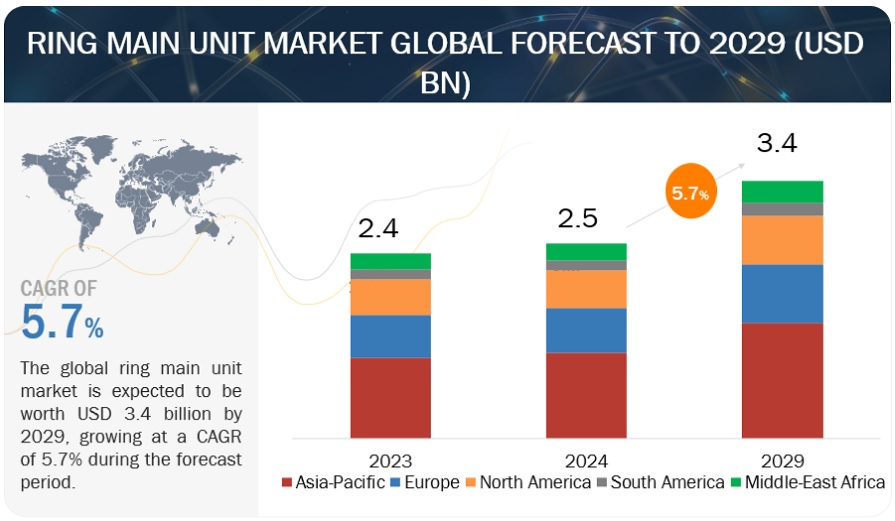According to a research report, Ring Main Unit Market is anticipated to grow significantly; estimates place it at USD 2.5 billion in 2024 and predict it will reach USD 3.4 billion by 2029, a Compound Annual Growth Rate (CAGR) of 5.7%.
The growth of the market can be primarily attributed to the expanding capacity of renewable energy sources and the ongoing efforts to enhance distribution networks, coupled with the modernization initiatives aimed at upgrading existing power infrastructure. As countries worldwide intensify their focus on sustainable energy solutions, there is a notable surge in the installation of renewable energy capacity, such as solar and wind power. This trend necessitates the integration of advanced technologies like ring main units (RMUs) to facilitate the seamless integration of renewable energy into the grid. Furthermore, the increasing complexity of distribution networks and the aging of existing power infrastructure prompt utilities to invest in modernization projects. These initiatives involve the deployment of state-of-the-art equipment like RMUs, which offer enhanced reliability, efficiency, and flexibility in managing electricity distribution.
Download PDF Brochure: https://www.marketsandmarkets.com/pdfdownloadNew.asp?id=51228954
The non-extensible segment, by structure type, is expected to be the most significant ring main unit segment during the forecast period.
The non-extensible segment is projected to emerge as the most significant segment in the ring main unit (RMU) market during the forecast period due to several factors. Non-extensible RMUs offer fixed configurations that are well-suited for specific applications and environments, providing reliability and stability in power distribution systems. These units are favored for their simplicity and robustness, requiring minimal maintenance and offering long-term operational efficiency. Additionally, non-extensible RMUs are often preferred for critical infrastructure applications where customization and flexibility are less prioritized compared to reliability and durability. As a result, the demand for non-extensible RMUs is expected to remain strong across various industries and utility networks, driving the segment’s prominence in the RMU market.

The commercial building segment is anticipated to be the second-largest ring main unit segment, by application, during the forecast period.
The commercial building segment is poised to become the second-largest segment in the ring main unit (RMU) market by application during the forecast period due to several key factors. Firstly, commercial buildings, including office complexes, shopping malls, hotels, and educational institutions, require reliable and uninterrupted electricity supply to support their operations effectively. RMUs play a crucial role in ensuring the stability and resilience of power distribution within these facilities, especially during peak demand periods. Additionally, as commercial buildings increasingly adopt energy-efficient technologies and integrate renewable energy sources, the need for advanced electrical infrastructure, including RMUs, becomes paramount. RMUs enable efficient management of electricity distribution, optimizing energy usage and reducing operational costs for commercial building owners and operators. Moreover, the growing emphasis on building automation and smart technologies in commercial real estate drives the demand for RMUs with integrated smart grid capabilities, allowing for remote monitoring and control of electrical systems. As urbanization and economic development continue to drive the construction of commercial buildings globally, the demand for RMUs in this segment is expected to witness significant growth, contributing to its prominence in the RMU market landscape.
Make an Inquiry: https://www.marketsandmarkets.com/requestsampleNew.asp?id=51228954
The air-insulated segment is anticipated to be the fastest-growing ring main unit segment, by insulation type, during the forecast period.
The air-insulated segment is poised to emerge as the fastest-growing segment in the ring main unit (RMU) market by insulation type, primarily due to several key advantages it offers. Firstly, air-insulated RMUs are renowned for their simplicity and reliability, as they do not rely on specialized insulating gases like SF6, making them more environmentally friendly and cost-effective. Additionally, air-insulated RMUs require minimal maintenance compared to gas-insulated counterparts, reducing operational expenses and downtime for utilities. Moreover, the modular design of air-insulated RMUs allows for easy expansion and scalability, making them well-suited for evolving distribution networks and urban environments where space constraints may be a concern. Furthermore, advancements in insulation materials and design technologies have enhanced the performance and reliability of air-insulated RMUs, further driving their adoption. As utilities increasingly prioritize sustainability, efficiency, and cost-effectiveness in their distribution networks, the air-insulated segment is expected to witness accelerated growth, cementing its position as a dominant force in the RMU market.
Asia Pacific is expected to be the fastest-growing segment in the global ring main unit market, by region, during the forecast period.
Asia Pacific is poised to emerge as the fastest-growing segment in the global ring main unit (RMU) market during the forecast period due to several compelling factors. Firstly, the region is witnessing rapid economic growth and industrialization, leading to a surge in electricity demand across various sectors such as manufacturing, infrastructure development, and commercial establishments. This escalating demand necessitates the expansion and modernization of power distribution networks, wherein RMUs play a pivotal role in ensuring efficient and reliable electricity supply. Moreover, governments in Asia Pacific are increasingly investing in infrastructure development projects, including the enhancement of electrical grids, to support economic growth and meet the needs of growing populations. Additionally, the region’s commitment to renewable energy adoption, driven by environmental concerns and energy security, fuels the demand for RMUs for integrating renewable energy sources into the grid. Furthermore, initiatives aimed at rural electrification and improving energy access contribute significantly to the growing deployment of RMUs across diverse geographical and socioeconomic landscapes in the region. The convergence of these factors positions Asia Pacific as a key market for RMUs, with substantial growth opportunities both in terms of market size and expansion rate in the coming years.
Request for Sample Pages of the Report: https://www.marketsandmarkets.com/requestsampleNew.asp?id=51228954
Key Market Players
ABB Ltd. (Switzerland), Siemens (Germany), Eaton (Ireland), Schneider Electric (France), and LS Electric Co., Ltd. (South Korea), Lucy Electric (UK), CG power & industrial solutions (India), Tiepco (Saudi Arabia), Orecco (China), Entec Electric & Electronics (South Korea) are major competitors in the global ring main unit market.


